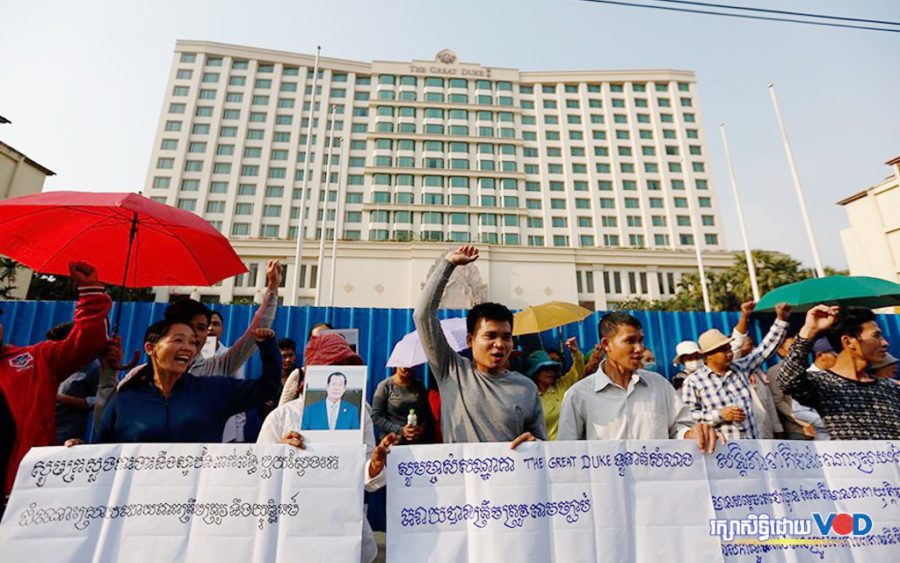The owner of the shuttered Great Duke Hotel in Phnom Penh has declined to offer unpaid seniority payments and other benefits demanded by workers, while agreeing to pay compensation for unused annual leave, according to the union representing workers in the ongoing dispute.
The Great Duke, formerly the five-star InterContinental Phnom Penh hotel, announced its closure on December 31 after 23 years in operation. The employer has claimed bankruptcy as the reason it could not compensate 138 former employees who are demanding unpaid benefits.
Officials last week did not confirm whether the hotel had filed for bankruptcy, but Labor Ministry spokesman Heng Sour told VOD last month that according to initial reports, the company behind the hotel was not bankrupt.
Last month, the Tourism Workers Union of the Great Duke Phnom Penh said it would not accept a proposal from Great Duke representatives to pay debt to workers in installments.
The labor dispute is now being considered by arbitrators, which are expected to announce a resolution later this month, the Arbitration Council Foundation’s director said.
Union president Touch Kosal said last week that negotiations between Great Duke and the union at the Arbitration Council on January 29 were not successful for ex-employees.
The company’s representatives agreed to pay compensation for unused vacation time, but declined demands for unpaid seniority allowance, compensation for failing to give workers sufficient notice of their termination and other benefits, Kosal said
The hotel’s lawyers insist that they “will not pay compensation because the hotel was bankrupt,” he said.
The Great Duke’s lawyer Nov Piseth and legal advisor Pan Ponlok could not be reached for comment on Thursday and Friday.
According to Kosal, the hotel representatives claimed that the union had used an incorrect method to calculate seniority payments, which he disputed.
The union leader said the employer was refusing to pay compensation for insufficient notice of termination because the union had allegedly violated an agreement with management in which workers had promised not to hold protests.
Kosal claimed the hotel lawyers’ reasoning for denying compensation violated the Labor Law and lacked evidence to support their claims.
Men Nimmith, executive director of the Arbitration Council Foundation, said the negotiations between the former Great Duke staff and its owner had only reached an agreement on unused annual leave so far.
“They have lawyers on both sides. So, they seriously work based on the law and bring all relevant evidence with respect to the proceedings of the Arbitration Council,” Nimmith said.
Asked about documents showing the Great Duke had gone bankrupt, Labor Ministry spokesman Heng Sour declined to comment or share documents from the two parties, saying in a message on Thursday that negotiations between the union and employer would be resolved by the Arbitration Council.
Commerce Ministry spokesman Seang Thay told VOD on Friday that he had not yet been able to confirm whether the Great Duke’s bankruptcy filing had been received by the ministry. He referred additional questions about the audit of the hotel’s income, which is necessary to declare bankruptcy in Cambodia, to the tax department.
Ream Ratha, head of the tax department’s administration and general affairs department, said that as of Thursday, he had not received documents from the Great Duke requesting an audit.
“The Great Duke? I have not received any information as of yet,” Ratha said.
Ath Thorn, president of the Cambodian Labor Confederation, said even if the owner declared bankruptcy, it did not mean that the company could avoid paying compensation to its former employees.
Despite a bankruptcy, business owners still had to deposit bankruptcy funds for workers in the treasury, according to the Labor Law, and there should be funds from the sale of hotel property after the bankruptcy declaration, Thorn said.
“In my opinion, the company should give [compensation] to resolve the dispute because they are the employees who helped the company profit a lot. And it’s the company’s image and reputation [at stake],” he added.
According to EuroCham, the hotel rebranded under the management of the Regency Company. Data from NGO Global Witness says the company’s shareholders have included the Thai Boon Roong Group, which has floated a proposal for $3-billion, 133-story twin skyscrapers in Phnom Penh.
Nimmith, of the Arbitration Council Foundation, said the labor-dispute resolution will be announced on February 20.
(Translated and edited from the original article on VOD Khmer)













